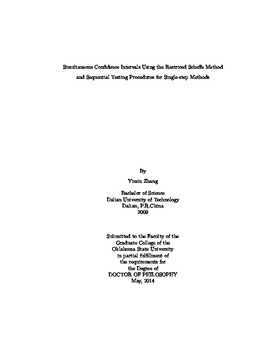| dc.contributor.advisor | McCann, Melinda H. | |
| dc.contributor.author | Zhang, Yimin | |
| dc.date.accessioned | 2015-06-17T20:08:50Z | |
| dc.date.available | 2015-06-17T20:08:50Z | |
| dc.date.issued | 2014-05 | |
| dc.identifier.uri | https://hdl.handle.net/11244/15216 | |
| dc.description.abstract | Multiple comparison problems arise when a set of inferences are considered simultaneously. When a separate inference approach is used to answer multiple related questions, it can cause many false positives and lead to erroneous conclusions. Multiple comparison procedures are used to deal with this issue and properly control for multiplicity through some joint measure of erroneous inference. A plethora of measures for error rates, as well as many methods addressing them, have been developed, although in this dissertation, we restrict our attention to familywise error rate (FWE), the probability of making at least one false positive among all the hypotheses. | |
| dc.description.abstract | Casella and Strawderman (1980) constructed a Scheffe-type confidence band for multiple regression over a restricted range of the predictor variables, the restricted Scheffe method. We propose applying this restricted Scheffe method to a discrete set of multiple comparisons. This proposed method requires minimal assumptions on the distribution of the estimated parameter vector and gives a less conservative solution than Scheffe's method. A rectangle embedding approach was introduced also by Casella and Strawderman (1980) to find appropriate restricted ranges for practical problem settings. However, this approach, which was developed for regression-type problems, encompasses a large excess of comparisons, and consequently causes rather conservative critical values. A new minimal cone approach is developed to address this issue by utilizing the discreteness of the comparisons to obtain the optimal restricted cone-shaped range. | |
| dc.description.abstract | Sequentially rejective methods are another type of multiple comparison methods in which the current step result depends on the test results of previous steps. We propose three sequentially rejective methods based on single-step methods, all of which control the FWE, to achieve improved power in multiple testing. We suggest modifications to the critical values such that the modified critical values are monotone at all times. To facilitate computation, two of the three proposed methods are developed to modify monotone critical values along the rejection path. Moreover, new sequentially rejective methods are developed from applying these modifications to the hybrid method proposed by McCann and Edwards (2000), and they are shown to often outperform Holms procedure and the stepdown Sidaks method. | |
| dc.format | application/pdf | |
| dc.language | en_US | |
| dc.rights | Copyright is held by the author who has granted the Oklahoma State University Library the non-exclusive right to share this material in its institutional repository. Contact Digital Library Services at lib-dls@okstate.edu or 405-744-9161 for the permission policy on the use, reproduction or distribution of this material. | |
| dc.title | Simultaneous confidence intervals using the restricted Scheffe method and sequential testing procedures for single-step methods | |
| dc.contributor.committeeMember | Ahmad, Ibrahim Abe | |
| dc.contributor.committeeMember | Zhu, Lan | |
| dc.contributor.committeeMember | Kable, Anthony C. | |
| osu.filename | Zhang_okstate_0664D_13255.pdf | |
| osu.accesstype | Open Access | |
| dc.type.genre | Dissertation | |
| dc.type.material | Text | |
| thesis.degree.discipline | Statistics | |
| thesis.degree.grantor | Oklahoma State University | |
